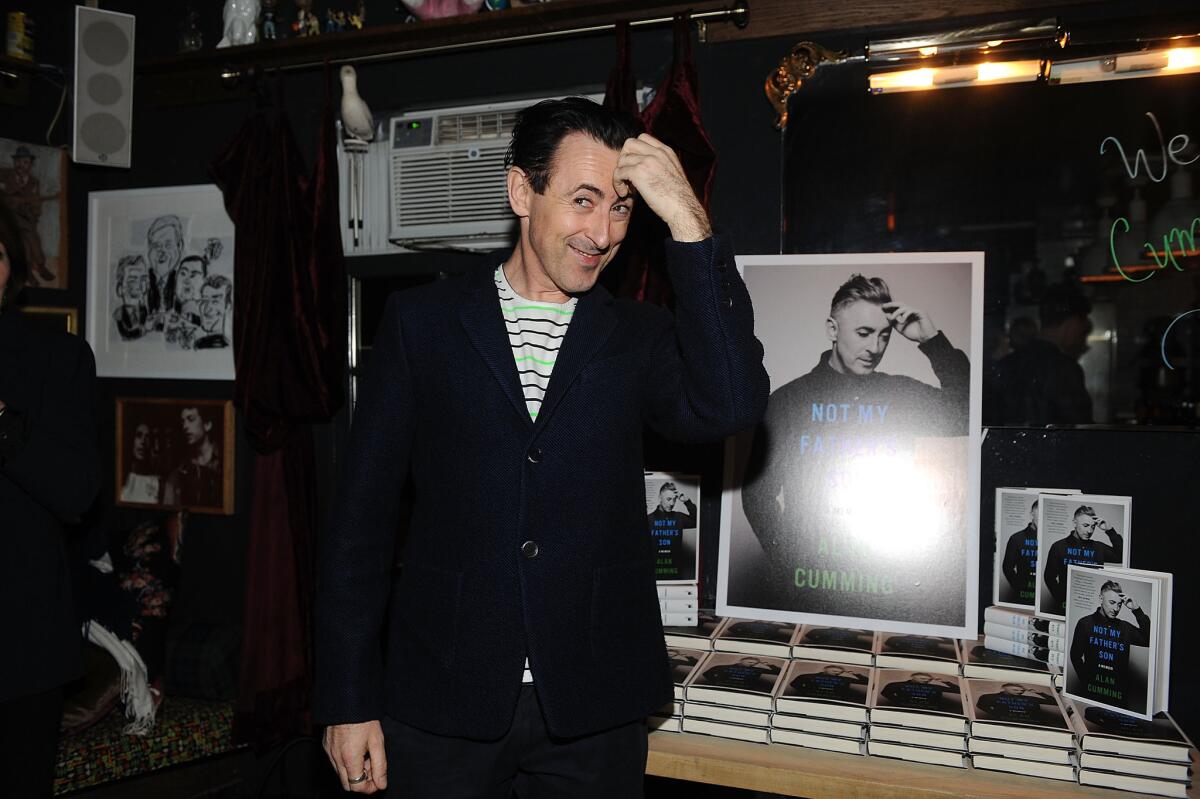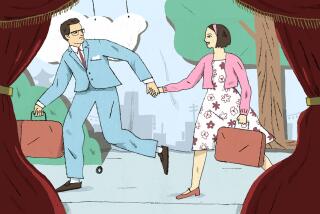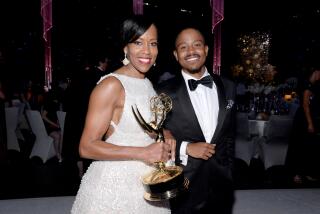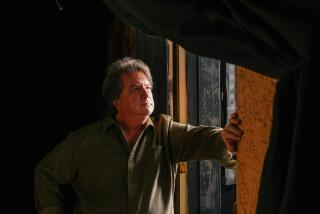Alan Cumming on digging deep for new memoir ‘Not His Father’s Son’

Like father, like son is not Alan Cumming’s story.
The 49-year-old actor, who can be seen on Broadway as the emcee in “Cabaret” or on the TV screen every Sunday on the CBS drama “The Good Wife,” makes sure that distinction comes through in his new memoir “Not My Father’s Son.”
The book brings out the family skeletons in the Scotsman’s closet. The memoir’s launching point is his filming of a 2010 episode of “Who Do You Think You Are?,” a popular reality show in which celebrities uncover genealogical mysteries. His episode was intended to focus on Cumming’s maternal grandfather. But the revelations extended beyond the cameras, with Cumming discovering disturbing information about his troubled childhood and relationship with his abusive father.
He spoke to us by phone from New York about shining a light on his past and the healing it brought about.
So often celebrity memoirs are decked out with listicles and witty essays. Yours takes readers in deep. Did it take some time to be OK with putting it all out there, being vulnerable?
Well, I didn’t want to write that kind of book, the other book. I did want to write about my life in some way, even before this happened to me. I wanted to write a book of various stories of things that happened to me. I was kind of nervous of being lumped in with that kind of fluffy book. I wanted to be more reflective.
So when this all happened, that summer that I write about, I just felt like if I wanted to really write about my life, I had to tell the whole story. And it was a big deal to go there, to jump off the cliff, but once I was able to jump, it was OK....
I sort of feel that I am the sum of all my parts. I wouldn’t be who I am if that hadn’t happened to me. In a way, the worst things that could happen to me, have already happened. So now I can go through life with a sort of lightness. And that’s a direct result of my father, in some ways.
Talk about the process of writing, and deciding on the format. You weave between the past and the present.
It took me a while. I started it different ways. But I realized in order to make sense of the present stories of that summer and the stuff I learned about my granddad and my own father -- in order to make sense of it, I needed to fill in a lot of blanks about my childhood and my father and what happened. That was when I realized the best way to do it was to go back and forth.
When you write something over a long period of time, quite radical changes can happen. What I had initially written is very different than what the book became. At one point, I actually thought of writing it in third person because I actually thought it would be too much. And actually, one of my favorite memoirs of all time is by Christopher Isherwood, called “Christopher and His Kind.” He writes about stuff in the third person. But I felt if I couldn’t be honest enough to say “I,” it would be disingenuous.
I imagine writing something like this would be emotionally draining.
I went through stages where I wasn’t able to do it because of work and stuff. I didn’t really have the luxury of choosing when I wrote because my time was taken up with filming on “The Good Wife” or other commitments. So I just had to kind of focus when I did have time to do it. And it’s funny because I have a house in the country where I always thought, “Oh, I can go there and write.” But I didn’t want to have to go to there write, I wanted that to be a place to relax. I joined this place in New York called the Writers Room, where they provide you with a workspace. It’s a really amazing environment of focused energy.
How would you compare the experience of being an actor to being an author?
I’ve written all my life in various forms. I like the psychology of it. I suppose when you are an actor you go inside and find your character’s voice. And I think in writing that’s the same thing. It was fascinating finding my voice in writing this book, and to see how it developed.
How did your mom and brother react when you told them you wanted to write a book that brought your back story to the center? It’s one thing to be open and tell your story, but it’s another thing to be open when it involves shining a light on other people that maybe don’t want that attention on their past.
Initially, of course, they were a little anxious, especially my mum. But I showed them the manuscript and told them if there was anything they were uncomfortable with, I would change it. There were a couple of things my mum asked me to change. But she and my brother have been incredibly supportive about the whole thing.
It’s a delicate thing, and they’re realizing it’s healthy to be open about it. We’re so used to not telling people about the bad parts or our life because we’re ashamed or we don’t want to be judged. It’s been a very liberating thing for them to see how people are reacting to it. What I hope comes across is that we grew stronger together in spite of him, in spite of my father.
I was sort of struck by how you were able to sort of accept that you weren’t going to have this intimate relationship with your father. That it was what it was. And you talk a great deal about how the press sort of played a part in the later years [Cumming’s father was frequently stalked for comment on Alan’s activities]. If your dad were still alive, do you think you’d have written the book?
No. I wouldn’t have written it because of that reason. I wouldn’t wish that on anyone. I really was so devastated when that stuff happened in the press. I felt really bad for him. One of the things of writing the book, I realized how ill he was. It actually made more sympathetic to him in realizing how irrational and mentally ill he was. I don’t know how able he would be to deal with this book and what I am saying.
A central focus of this book is what is family, and the parent-child relationship and what that really means.
Yeah, over the years, I realized a lot about family: how you make your own family. How you can find strength in your friends. But in terms of my mom and my brother, our relationship has really strengthened by the fact that we’re talking about it again through this book.
Twitter: @villarrealy
More to Read
Sign up for our Book Club newsletter
Get the latest news, events and more from the Los Angeles Times Book Club, and help us get L.A. reading and talking.
You may occasionally receive promotional content from the Los Angeles Times.







